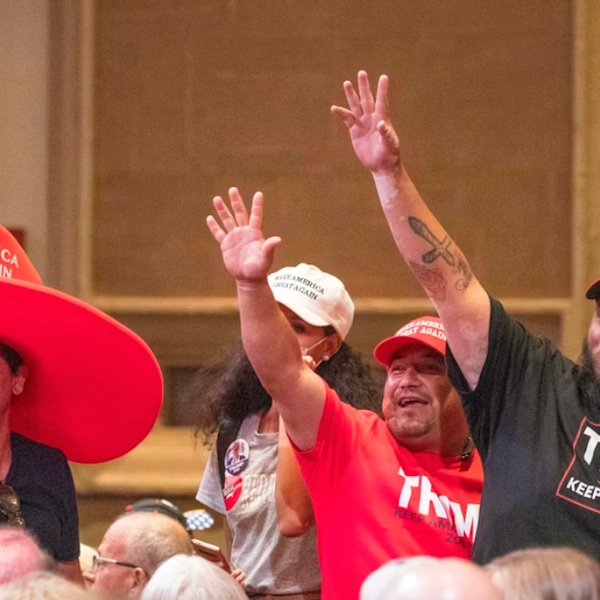
By David Lightman, McClatchy Washington Bureau (TNS)
WASHINGTON — The Democratic left is rising, and it’s unclear whether that will help the embattled party prosper or sink.
Ideology-driven movements and candidates tend to seize the spotlight in party presidential nomination contests, and so far, the left has the momentum. Its anointed candidates, though, have a problem: Being too closely identified with a party’s ideological wing usually means general election trouble.
A preview of the good and bad times ahead surfaced in recent weeks.
The Democrats’ progressive wing this month led a strong but ultimately unsuccessful push to strip from the congressional budget bill provisions easing restrictions on financial institutions.
Activists have launched an energetic effort to boost Democratic Sen. Elizabeth Warren of Massachusetts for president, but Warren says she isn’t running.
Polls show significant disenchantment with mainstream Democrats, but mainstream icon Hillary Clinton retains a huge lead among Democrats for the 2016 presidential nomination.
Progressives interpret all this differently, saying it helps create awareness of their mission. “We want to unrig the playing field. We want people to not feel the fix is in on every level,” said Adam Green, co-founder of the Progressive Change Campaign Committee.
They paint even the recent setbacks as detours on their path to progress. The December McClatchy-Marist poll found that in the 2016 Democratic nomination contest, Clinton won 62 percent support from Democrats, while Warren got 9 percent. Among liberals, Warren rose to only 11 percent, while Clinton’s number doesn’t move.
Liberals read the poll differently. They see 38 percent of voters who are considering an alternative to Clinton.
They also note that liberals are uneasy — 48 percent said they disapproved of the job congressional Democrats are doing, compared with 45 percent who approved.
MoveOn.org Political Action launched a petition drive Dec. 10 promoting a Warren candidacy and has more than 100,000 signatures. “This moment was made for Senator Warren,” said Ilya Sheyman, the group’s director.
Democracy for America, a progressive Democratic political action committee, donated $250,000 to the draft-Warren effort. Warren is “Democrats’ most powerful voice in the fight against income inequality,” said Charles Chamberlain, the group’s executive director.
Warren first gained public notice while a Harvard University law professor advocating a consumer financial protection bureau. The Dodd-Frank financial regulatory overhaul of 2010 established the agency, and Warren won a Senate seat two years later.
The 2014 budget bill eased some of the restrictions imposed on financial institutions in the Dodd-Frank measure. Warren was outraged and helped rally congressional Democrats against the change.
But the outcome was also a cautionary tale, because the budget measure passed with a bipartisan majority and the provision intact. Nor are liberal initiatives likely to get much legislative traction next year.
The liberals’ Social Security expansion, for example, would be funded by lifting income caps on taxes. Currently, once one’s income tops $113,700, he or she pays no more Social Security taxes this year.
Such measures have little chance in a House of Representatives where Republicans will control 247 of the 435 seats, the party’s biggest majority since 1931. In the Senate, where it usually takes 60 votes to get much done, Republicans will control 54 of the 100 seats.
Democrats also face the kind of civil war between liberals and center-left stalwarts likely to rage not only in Congress but also throughout the 2016 presidential primary season. Centrists want the party to provide economic incentives for people to succeed, relying less on wealth redistribution through higher taxes or guaranteed incomes. Nor do they see mobilizing voter outrage as a useful general election strategy.
“Americans don’t want angry, defensive figures running for president,” said Will Marshall, president of the centrist Progressive Policy Institute.
In more conservative states, Democrats don’t share the liberal views. The more the left defines the party, say centrists, the more Democrats will suffer in the South and perhaps elsewhere.
Party officials are taking a hard look at the future. A Democratic National Committee panel is undertaking a top-to-bottom analysis of the party, with a preliminary report due in February. “We’re not presupposing or pre-concluding what is wrong,” said party Chairwoman Debbie Wasserman Schultz.
Centrists and liberals do agree on this much: The key to Democratic success is convincing middle-class voters that the party understands them and wants to help.
“The first thing the party has to do is stand for something, and the primary focus needs to be an economic agenda,” said Roger Hickey, co-director of the Campaign for America’s Future, a liberal group.
That could be tough, said Republican pollster Ed Goeas. The middle class agrees “the rich are getting richer,” he said, “but they think the poor get all the (government) benefits.”
The party’s image is already tainted, moderates argue. They point to Democratic losses across the South this year, as former South Carolina Gov. James Hodges, a Democrat, warned that the party needs to break away from its reputation as liberal-driven.
“If Democratic candidates in the South had the coattails of JFK and FDR today, we’d still have lost,” he said.
Photo: Senate Democrats via Flickr








